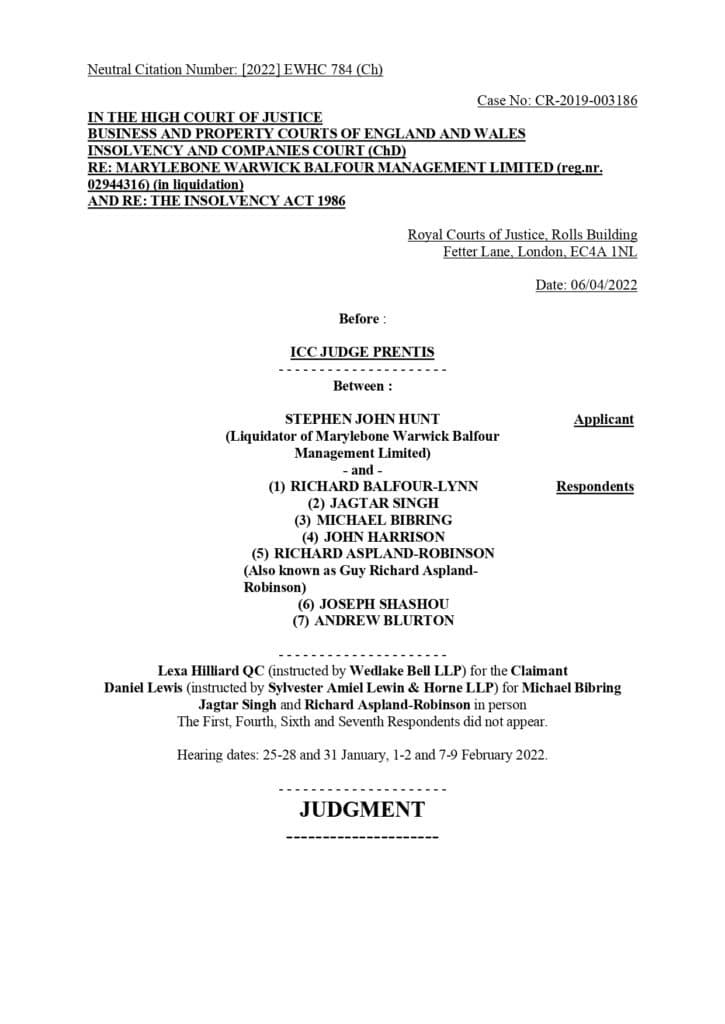The recent High Court case of Hunt v. Balfour-Lynn and others [2022] EWHC 784 (Ch) establishes that directors of a company may not necessarily breach their fiduciary duties by participation in a tax avoidance scheme where they can point to reasonable reliance on professional advice; in this case from an auditor and counsel. The liquidator lost the claim – the court held that payments made under the scheme were not made with the intention to defraud creditors.
Alleged breach of Directors Duties
The claim was brought in the High Court by Mr. Stephen Hunt, the official liquidator of Marylebone Warwick Balfour Management Limited (“Company”) based on a tax avoidance scheme entered by the Respondents between September 2002 and August 2010 whereby £27,706,849 of PAYE and NICs due to HMRC in respect of the Respondents’ remuneration was paid to the Respondents.
The claimant asserted that the commencement of the avoidance scheme and its continuation constituted a breach of the respondents’ fiduciary duties and such payments fell within the ambit of “transactions defrauding creditors” under section 423 of the Insolvency Act 1986.
Mr. Hunt’s breach of duty claim was based on the contention that the Respondents failed to consider the Company’s interests and acted out of selfish motives as they entered into and continued an aggressive tax avoidance scheme which was likely to be challenged by HMRC as they were aware of inquiries made by HMRC into the scheme, and thus likely to cause the Company loss, committing a breach of their duties under section 172 of the Companies Act 2006 whereby the directors of a Company are required to act in good faith and promote the success of the Company. The Respondents denied the claims of any breaches and maintained that they had reasonable and responsibly relied on the advice of BDO (an accounting firm) before and during its participation in the scheme.
Defence against Breach of Directors Duties
With reference to the breach of duty claim, the purpose of the scheme was brought into question. The Defence refuted claims of such breach by asserting that the Scheme worked to incentivise the Company’s employees to continue their employment and promote the success of the Company. The Respondents were advised by BDO and leading tax counsel that the Company could legitimately avoid paying NICs and PAYE to HMRC. The Respondents had reasonably expected to be advised by BDO in case there was any real risk of liability to HMRC.
The Court observed that the Scheme was put into place for genuine commercial reasons, and it was unrealistic to believe that the Respondents when sitting in on consultations, should have set aside the advice they were hearing as it was not formally addressed to them.
Additionally, BDO had no vested interest in the continuation of the Scheme as there was no evidence to suggest that the fees paid to BDO were intended to influence the advice dispensed by them. In taking advice on their duty to ensure the Company’s payments of PAYE and NICs from BDO which was not contradicted by the Company’s auditors, the Respondents had fulfilled the same.
The Court also observed that under section 172 of the Companies Act, the directors’ duty to consider the interests of the creditor will only arise when they know or should know that the Company is likely to become insolvent. In the case at hand, the Company’s status was consistently being overseen by its auditor and BDO and thus the Respondents could not have reasonably been privy to the probability of the insolvency of the Company.
The second claim dealing with Section 423 was also dismissed by the Court as reliance was placed on JSC v Ablyasov which distinguishes “purpose” as a precondition for liability under the Section from “consequence”. The Company’s failure to pay NICs and PAYE to HMRC was a consequence of the Scheme and not the purpose. There was sufficient evidence to suggest that the Respondents would not have avoided payment to HMRC if they had believed the same to be an illegitimate course of action.
The Implications
This judgement illustrates that directors of a Company cannot easily be held liable for breach of their duties in making certain decisions when those decisions are based on reasonable professional advice obtained from a competent authority and thus, reduces the probability of future litigation against directors/officers of a company based on similar claims of breach of duty.
The case is of utility to Directors defending a successful claim brought under section 212 or 423 of the Insolvency Act 1986, primarily in situations where the directors have relied on professional advice.
Download the Judgment
Instructing our Company Dispute Lawyers
We ensure that we provide the best possible outcome for our clients by conducting in depth investigation and research into the realistic prospects of a case before selecting the appropriate course of action in order to reduce time and expense. Liability for costs is always an issue in litigation and based on our extensive litigation experience we provide our clients with as much strategic, practical as well as carefully considered legal advice in order to ensure minimum risk in respect of costs. Where appropriate we encourage the use of alternative dispute resolution (such as mediation and without prejudice negotiation) and our lawyer’s negotiation skills are first class. If early settlement at advantageous terms is not possible, we are extremely experienced and capable at navigating our clients through the litigation process.
Optimal Legal Results.
Our litigators deliver advanced legal strategies.
We analyse and work out the legal merits of running your case to trial. We calculate and advise on legal risk factors and the litigation rules in England & Wales. We factor in your risk-appetite, costs sensitivity and determination. Together, we plan the best possible result.
You’ll receive strategic legal advice from a barrister and solicitor at your first fixed fee meeting.

